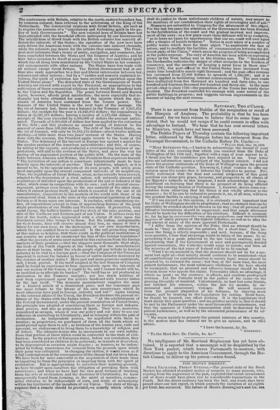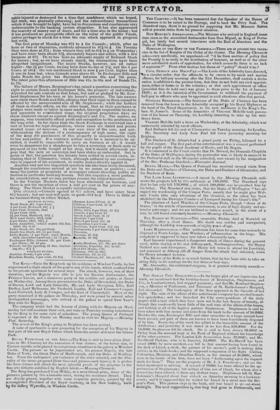THE MONEY MARKET.
STOCK EXCHANGE, FRIDAY EVENING.—The present state of the Stock Market has afforded abundant matter of surprise to many persons, who, arguing from the experience of the past, expected that recent occurrences out of doors would have given rise to considerable transactions in the Funds. But the direct contrary has been the fact, and whole days have passed since our last report, in which scarcely the variation of an eighth per Cent. has occurred. The failure a Messrs. fieminaton's and Co. ha.%
agkin injured or destroyed for a time that confidence which we hoped, last week, was gradually returning; and the extraordinary transactions which it has brought to light, have led to discussions and conclusions very unfavourable to the banking system altogether. It has also aggravated the scarcity of money out of doors, and for a time also in the house ; but it has produced no perceptible effect on the value of the public Funds, unless perhaps to check for a time the rise which appeared in progress last week.
The first price of Monday was 872 to / for Consols ; which, after an hour or two of stagnation, suddenly advanced to 87i to . On Tuesday they were done at 871 ; from whence they fell to 871 to on Wednesday ; and have since been about 87/, alternately buyers and sellers, with a few bargains at 872. There has been an adequate supply of Reduced Stock for money; but, as we have already stated, the transactions have been altogether insignificant. The. heavy Stocks, however, are all, rather higher : the 31 per Cents. having been done to-day at 95/, and the 4 per
Cents. at 1051 : the last-mentioned Stock is now per Cent, higher than it was in June last, when Consols were above 89. In Exchequer Bills and India Bonds the price has fluctuated between 65s. and 70s. prem. The latest price this afternoon of Bills was 67s. to 69s. and of Bonds 71s. to 73s.
The failure of Messrs. Remington's has raised a question concerning the right to certain Bonds and Exchequer Bills, the property of individuals, deposited for safe custody in that hduse, but sold or pledged by Mr. Row- land Stephensonlor his own or his house's purposes. The late owners now claim these Bonds and Bills, alleging that their right to them cannot be affected by the unwarranted acts of Mr. Stephenson ; while the holders of them as stoutly affirm, an the other hand, that as their purchases or pledges were made or taken in open market, through respectable brokers, and agreeably to established usage, the original proprietors have no claim whatever except as against Remington's and Co. The matter, we suppose, may eventually afford profit and occupation to the gentlemen of the long robe. In the mean time the Stock Exchange is converted into a
sort of forum for legal disquisition, where cases are stated and points mooted =gut col nauseant. In our own view of the case, and not-
withstanding the dictum of a contemporary of high name, the right
of the bona fide purchasers of this property is unquestionable both in law and justice. If a contrary notion were for a moment to be ad-
mitted, it would be impossible to carry on business at all : it would , even be dangerous for a shopkeeper to take a sovereign or Bank-note in payment of any trifle bought at his shop, lest it should afterwards ap-
pear that the note or sovereign had been stolen or embezzled. But in point of fact, the question has already been settled in several cases, in- cluding that of Chaumette,, which, although adduced by our contempo- rary in support of his argument, in reality makes directly against it.
Another and not less important question has also been freely discussed, though the conclusions arrived at are by no means so positive ; —we mean the justice or propriety of newspaper editors directing public at- tention to particular banking-houses. But this requires a more particu- lar consideration, and we may perhaps resume the subject hereafter. In the Foreign Markets there has been absolutely no business, told there is not the variation of even a half per cent in the prices of any- thing. The Share Market is equally uninteresting.
ONE O'CLOCK.—Consols opened at 87 sellers, and have since been
872 buyers ; but are now not quite so good-874 to There is little or no business doing in either Market.
BRITISH FUNDS.
Bank Stock, div. 8 per Cent. 3 per Cent. Reduced, sq 3 per Cent. Consols, shut 34 per Cent. 1818, 34 per Cent. Reduced, 954 2 New 4 per Cents. 1822, shut 4 per Cents. 1826, 1054 Long Annuities, (which expire 5th Jan. 1860) 194 9-16 India Stock, div. 104 per Cent.
South Sea Stock, div. 34 per Cent.
India Bonds, (4 per Cent. until March, 1820, thereafter3 perCent.) 73 74 pm. Exchequer Bills, (Merest 2d. per Cent. per Diern,) 69, 68 pm. Consuls for the opening, 21 Jan. (includ- ing div.) 8fI
FOREIGN FUNDS.
Austrian Bonds, 5 per cent. Brazilian Bonds, 5 per cent. 64 644 Buenos Ayres 6 Cent. 47 48 Chilian, 6 per Cent. 22 23 Colombian, Ditto, 1824,6 per Cent. 23 231 Danish, 3 per Cent. 63 Greek 0 per Cent. 16 17 Mexican 5 per Cent • Ditto 6 per Cent. 324 33 Neapolitan 5 per Cent. Peruvian. 6 per Cent. 174 184 Portuguese, 5 per Cent. 534 54 Prussian, Russian, 95 954
Spanish, 10 104
SHARES.
Anglo-Mexican, 22/. 10s, per share Brazilian, Imperial, 621. to 64!. Real Del Monte, 150/. Bolanos, 3851. to 395/. Colombian, 141. to 15/. United Mexican, 141. 10s. to 15/.






















 Previous page
Previous page